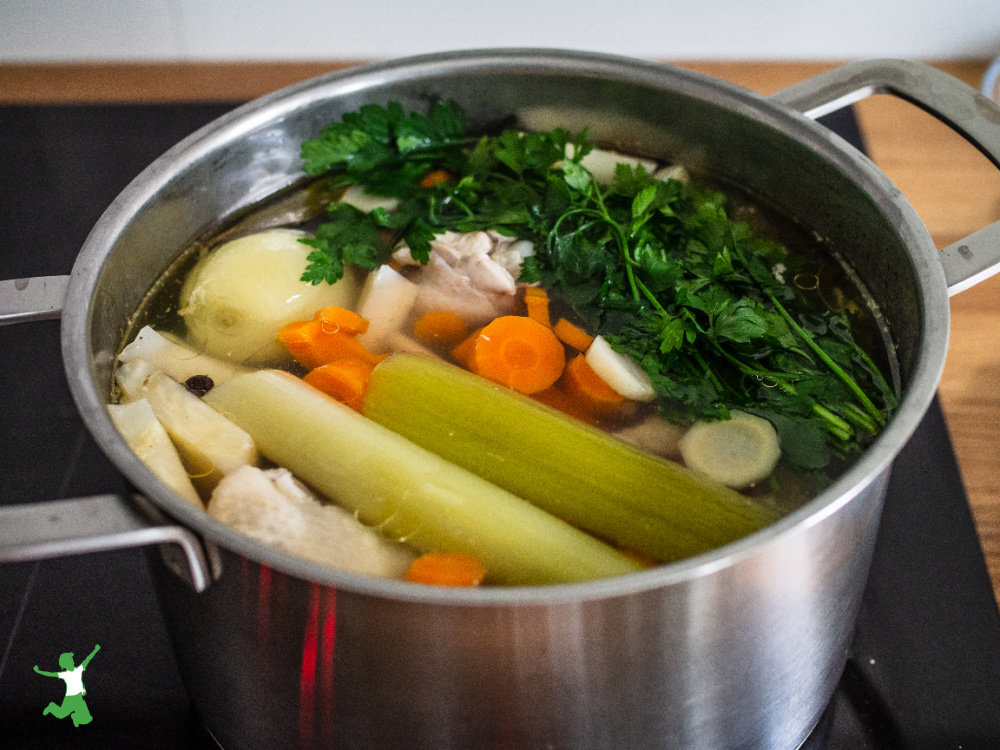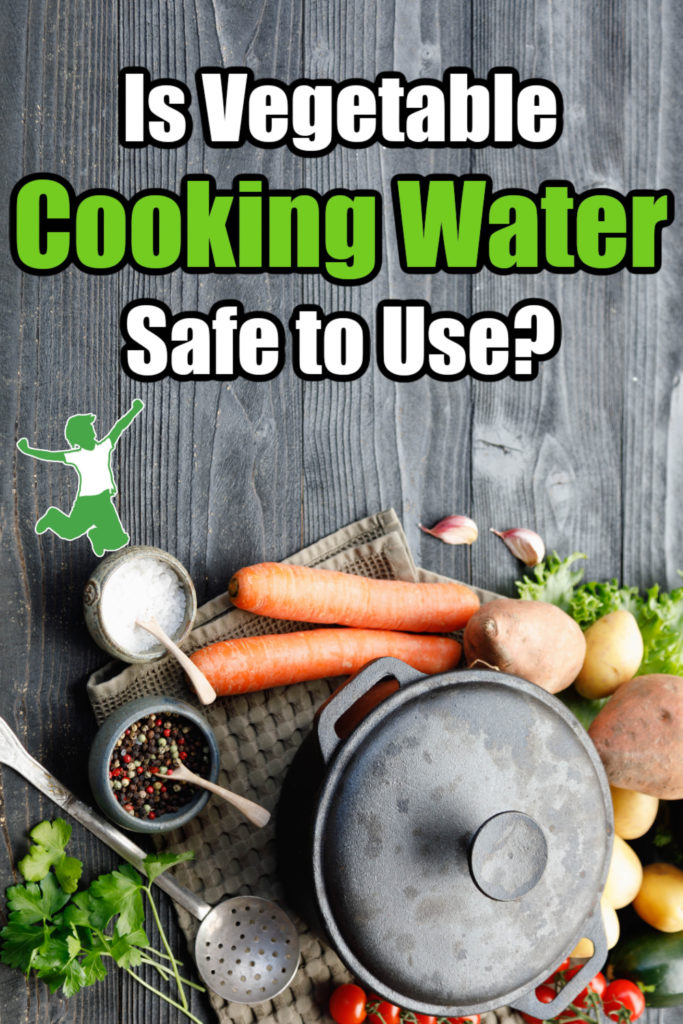Guidelines for when vegetable cooking water is safe to use and when it is best to toss due to nitrites, residues or anti-nutrients that can do more harm than good.

Adelle Davis popularized the practice of saving vegetable cooking water during the Leave it To Beaver era of the American 1950s.
She reasoned that any vitamins and minerals lost from cooking the vegetables would end up in the water.
This supposedly nutrient-rich cooking water could then be added to homemade soups or sauces with the nutrition benefiting those that consumed them.
This notion took hold and has not let go to this day.
Unfortunately, reserving vegetable cooking water can do more harm than good.
Consider the reasons below before you use it in your dishes. How to know your veggie cooking water is safe is discussed as well.
Chemical Residues
If the vegetables that are cooked are not organic, pesticides and nitrites from commercially produced fertilizers can end up in the cooking water.
Even low to no spray veggies such as asparagus would not be safe.
These crops are still typically fertilized with commercial preparations that are high in nitrites.
Anti-Nutrients
Cooking cruciferous vegetables such as broccoli, cauliflower, cabbage, Brussels sprouts, and kale would add goitrogenic (thyroid blocking) substances to the cooking water which should be discarded.
Water used to boil potatoes would contain chemicals called hemagglutinins that disrupt red blood cell formation.
Dark green, leafy vegetables such as beet greens, raw spinach, and chard contain oxalic acid that blocks calcium and iron absorption.
This irritating substance also can cause distress to the sensitive mucous membranes in the mouth and intestinal tract and contributes to the formation of kidney stones.
Consuming raw crucifers or dark, leafy greens is not an alternative either as the substances that cause problems when in the cooking water also cause problems if consumed directly with the vegetable in an uncooked state such as a raw green smoothie.
Legumes & Beans
For the last few years, the vegan community has popularized the trend of reusing legume cooking water, particularly from chickpeas.
This isn’t a safe practice even if the legumes or beans are soaked before cooking.
This soapy, slimy water is called aquafaba and is used as an egg replacement, particularly in dessert recipes. It whips up foamy just like egg whites.
Published research reveals that chickpea cooking water contains saponins, a potent anti-nutrient that contributes to leaky gut, which is at epidemic levels today.
It is also not advisable for pregnant women to consume this substance as it is a miscarriage risk.
Safe Vegetable Cooking Water
Do you really want to use vegetable cooking water as a frugal tool in your kitchen routine?
Consider this list of some of the most popular vegetables below. They are safe to use for that purpose.
- carrots
- turnips
- potatoes (peelings)
- parsnips
- beets
- celery
- organic pumpkins and squash (including zucchini)
- organic onions, leeks, and garlic
- nightshades (tomatoes, eggplant, and peppers among a few others)
For example, this potassium broth recipe uses vegetables simmered in water from the list above.
Simple Guidelines To Follow
Do you find it confusing to remember the distinctions between which organic veggies are safe to use and which are not?
Or, do you buy some veggies organic and others conventional?
If so, it is best to just adopt the practice of not using the cooking water at all.
This is particularly true if you tend to mix veggies together when cooking them.
Never Use Veggie Water for Baby Food
It is of particular importance NOT to use vegetable cooking water for use in pureeing homemade baby food.
Use pure filtered water instead, or if baby is old enough, some homemade bone broth or meat stock.
Final Caution to Consider
One final word of caution.
All vegetables tend to form nitrates after cooking and during storage. These nitrates can transform into strong carcinogens in the intestines.
Hence, it is best to avoid refrigerating and reheating vegetables, particularly leafy, green vegetables which concentrate nitrates when grown commercially.
References
Nourishing Traditions Cookbook









Hi Sarah. I really enjoy reading your blog and I came across this post today. I have been making fish broth with bonito flakes (can’t get fish heads in utah) and I make a big batch every week or so. For lunch, I reheat a cup of broth on the stove and add a splash of coconut aminos (like soy sauce but from coconut sap), some pieces of thinly slices seaweed, pink himalayan sea salt and I was adding several pieces of kale as I reheat the broth. then it dawned on me that maybe I should pre-cook the kale and discard the water. My plan was to boil the whole batch of kale and then use the pre-cooked pieces to add to my broth as I reheat it for lunch. You say that it’s not a good idea to re-heat vegetables but I’m wondering if it makes a difference if I add the pre-cooked kale after the broth has been reheated (so it’s not reheating along with the broth). I know ideally I should be cooking the kale in a separate pot as I reheat my broth but that is a lot to do every day for lunch. what are your thoughts?
Another one wondering about freezing extra veggies. I’ve spent the last two weeks fine-tuning how many veggies we cook and have always come up short (that is, we were still hungry so had to add something to the meal). I’m wondering if I can freeze extra veggies instead of putting them in the fridge… defrosting by reheating in soup, for example, which was eaten immediately and not saved again.
I’m confused. Should I toss the water I cooked my veggies in? Or save it? http://t.co/pPszG2Ph vs http://t.co/ohrCPpe2 #question #food
I am also wondering about the safety of freezing cooked vegetables. I was planning to blanch and freeze spinach for use this winter, and sometimes I like to make a big meal and freeze leftovers. If I freeze immediately, does this inhibit the formation of nitrates, or is it still problematic?
Thank you for this info, Sarah. We grew lots of beets, chard and bok choi last year, and then blanched and froze them for later use. Is this ok, or are we just eating piles of nitrates? I love having the greens through the winter. Do you have other suggestions for preserving?
Do you have a citation for not saving and reheating vegetables? I have never heard this before, even from NT. Just curious where it came from.
Yes, the source listed at the end of the post is Nourishing Traditions Cookbook.
The page numbers in my edition are p. 366-367.
Fascinating, Sarah. Thanks for another great article. 🙂
I’ve never thought of it this way. What are your thoughts on using this water to water your plants?
I am wondering about this as well. One of my friends suggested using it to water plants but would it be unhealthy for them also???
did you ever get an answer? ive been wondering the same but i would be using it on veggies that we eat so i’m assuming it isnt safe?
Sarah, I am in a state of angst this morning, as I just read an article in Countryside magazine that has me convicted that I need to share this info with everyone who is concerned about real food and good nutrition. This article is entitled, “Whatever happened to the Food Safety Modernization Act?” It states that the Health and Human Services dept. is currently trying to pass legislation that will make the buying or selling of raw food ILLEGAL, even to the point of placing an individual under “surveillance” without their knowledge or consent. UNBELIEVABLE! You may already know about this, but they want to be able to say that no one has a fundamental right to obtain any food they wish! Please encourage your readers to find out about this and FIGHT for our freedom! Thank you for being a voice for reason!
Its absolute bullcrap that the government can get away with outlawing real, nutritious raw food. Go figure that it appeared in a “Countryside” magazine, too.
If their do concerned about “food safety” why don’t they outlaw factory farms and all the psuedo-garbage chemical-laden junk that the USDA tries to dupe everyone into believing its food? I never understand this.
Hi Sarah,
I am loving your website, and combing through every video and recipe as time permits! I just want to clarify something about the raw veggies…. green or red lettuces are okay along with carrots, onions, green or red peppers in a raw salad? Is that right? Also, I would like to know about cooking veggies in soup, such as potatoes, carrots, onions, etc….or should they be cooked first as well before adding them to the soup? Also, can veggies like green and red peppers, onions, potatoes, and green beans be reheated or is it alllll veggies?
Hi Beth, those veggies are great for a raw salad. I typically cook potatoes first in water, discard the water and then add to the soups. Veggies that are safe to use the cooking water for, carrots, onions etc, I cook right in the broth or water that is the soup base. Leafy greens are the worst for forming nitrates when refrigerated, reheated. Others are much safer to use, but try to limit it as much as is reasonable. I reheated some leftover green beans today for lunch, but there were only a few and I don’t do this often.